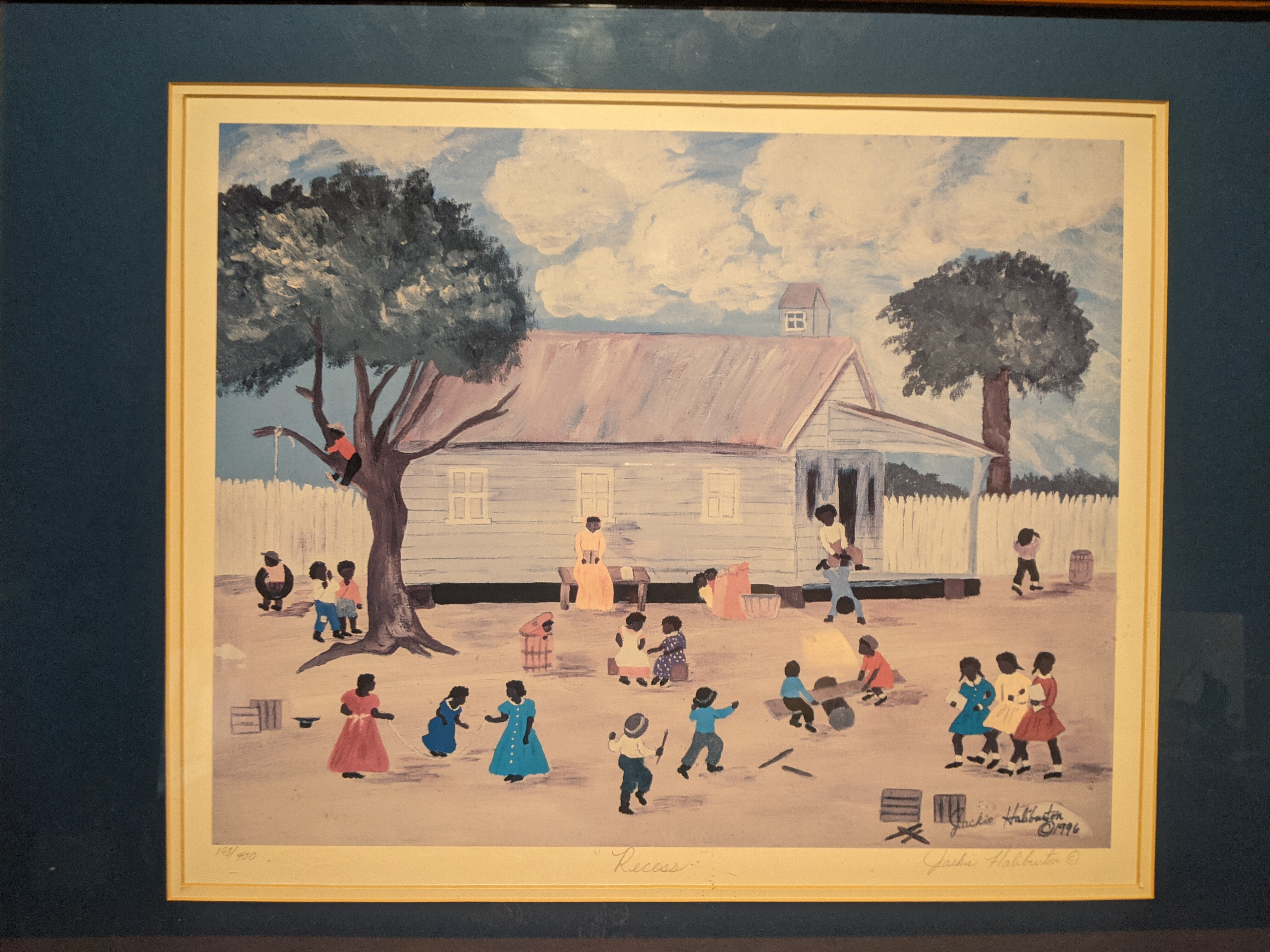Looking to Holy Week
April 08, 2025

Through him, then, let us continually offer a sacrifice of praise to God, that is, the fruit of lips that confess his name. Do not neglect to do good and to share what you have, for such sacrifices are pleasing to God.
~Hebrews 13:15-16
Transformative Giving
Over the years, the Knighten family has accumulated and curated a pretty good art collection. As a family, we deeply appreciate the work of artists of all types, and we see their work as gifts to the world. Not long ago I received an email from Saint John’s member, Julie Peckham, about a piece of artwork. The email contained a picture of a piece created by artist Jackie Halliburton that had been in Julie's parents’ home, and she believed it to be a painting of one of the Rosenwald Schools. She wondered if I knew of anyone that might like to have it.
I had never heard of Rosenwald Schools and I needed to find out more, so like any good, modern researcher, I googled it. What I discovered was an amazing story about the history and impact of the Rosenwald Schools throughout the southern United States. The schools were named for their primary donor, Chicago businessman Julius Rosenwald, who was the son of German Jewish immigrants and a clothier who later became the president of Sears, Roebuck and Company.
In 1912, Rosenwald was a member of Tuskegee University’s Board of Trustees when Booker T. Washington came to him to suggest donating funds specifically for building Black schools. At that time, most Southern states provided little to no public funding to adequately educate Black children, and many rural communities had no schools for them at all. From 1913 to 1932, nearly 5,000 “Rosenwald schools” were built in 15 states, mostly in rural Southern communities. These schools were built specifically to educate Black children, and by 1928 one in three rural Black schoolchildren in the South attended a Rosenwald school. Residents in these areas were usually the driving force behind bringing a Rosenwald school to their community and fundraising often became a community-wide undertaking. Families organized fundraisers around dinners, picnics, and penny drives, or they would put aside portions of their wages or cotton crops to support school building efforts.
This collaboration between Julius Rosenwald, Booker T. Washington, and communities throughout the South has been called one of the most transformative initiatives to advance education in the 20th century. I am grateful to Julie for sharing this amazing story with me in a very creative way.
In Hebrews 13, the author reflects about the power of giving. Specifically, the writer describes the giving of Jesus as a sacrifice. The writer of Hebrews instructs the audience to offer sacrifices of their own: praise, good deeds, and fellowship. By this point of the letter, they know who God is and what God has done on their behalf. They also know specific ways they should live, but the image of a sacrifice through all times captures the ongoing application of Christian theology in Christian life. Praising God, doing good, and caring — in other words, a right relationship with God, self, and others — will please the God who will sustain us forever.
The story of the Rosenwald Schools is an excellent example of people coming together to share what they had to do good in the world. How might God be calling you to share your prayers, presence, gifts, service, and witness in transformative ways this Advent season?
A Better Life for Their Children: Julius Rosenwald, Booker T. Washington, and the 4,978 Schools that Changed America -
Photographs and Stories by Andrew Feiler
Exhibit at the Bullock Texas History Museum, now through February 23, 2025
Now through February, the Bullock Museum is hosting A Better Life for Their Children, an exhibit of photographs and stories by Andrew Feiler which document the history of Rosenwald schools. From the Bullock museum's website:
"The exhibition features 23 black and white photographs of Rosenwald Schools across the country as they exist today. Brief narratives written by Feiler accompany each photograph, telling the stories of Rosenwald schools’ connections to the Trail of Tears, the Great Migration, the Tuskegee Airmen, Brown v. Board of Education, and more. Together, photographs and narratives from cities and towns from Texas and throughout the South show the schoolhouses and the people for whom they meant so much."
In February, the museum will present a screening of the movie Rosenwald by director Aviva Kempner. Following the film will be a discussion on the preservation of Rosenwald schools. More information on the film is available here.
April 08, 2025
April 01, 2025
March 25, 2025